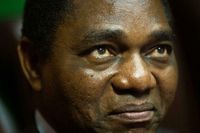
People from around Southern Africa and the world rejoiced last week as Hakainde Hichilema of the United Party for National Development (UPND) beat incumbent Edgar Lungu to become the new President of Zambia. Lungu had been coming under increasing criticism for his poor management of the Zambian economy and his rising authoritarianism, which saw Zambian voters kick him out of office.
But what are the lessons from Zambia and what can people in the opposition in places like South Africa learn from Hichilema’s win and Zambian politics in general?
This was Hichilema’s sixth attempt at the Presidency. He participated in five previous elections and came up short in each of them. In 2016 he missed beating Lungu by the barest of margins in an election viewed as significantly flawed by outside observers.
Hichilema also faced oppression from the Zambian government, being arrested on trumped up charges and being held in solitary confinement by the Lungu regime. During this recent election campaign, opposition supporters were intimidated and prevented from campaigning, with the government often claiming that this was necessary because of restrictions around Covid-19. Lungu also allegedly used government resources in his campaign.
Despite this, Hichilema continued to oppose the Zambian government, campaigning hard in 2021, and reaping the rewards, becoming the country’s seventh president.
Some people seem to believe that Africans are born socialists and no party that is committed to fiscal restraint and the free market will be able to win on the continent. However, Hichilema and the UPND are committed to these ideals and managed a comfortable win in the election. The UPND’s manifesto states that it is committed to bringing debt under control and asserting fiscal discipline. It also promises to reduce the tax burden on ordinary Zambians (unlike the ANC, which seems to think taxpayers have bottomless money pits). It is also committed to decentralisation of the state, again in contrast to our own governing party, which wants to centralise as much power as possible, acting as if it knows more about what is best for ordinary people than they do themselves. The UPND also acknowledges the importance of market confidence and the private sector in development.
Related to this is the need to put economic issues front and centre. Hichilema did this and he was rewarded with a resounding win.
Zambia showed that the race of potential leaders is not as important as some would have us believe. Here in South Africa we are constantly told that the DA is making a mistake by appointing white people to leadership positions. The party was recently criticised for selecting Geordin Hill-Lewis as its candidate to become the mayor of Cape Town. However, Zambians have shown that the race of candidates is not the most important factor when voting for leaders.
Guy Scott, a white Zambian, served as the vice-president of the country between 2011 and 2014. He served under Michael Sata, who was elected President in 2011. Sata died in 2014 and Scott served as interim President until 2015, when Lungu was elected. Scott was the first African leader of European descent on the mainland of sub-Saharan Africa since South Africa’s FW de Klerk. At the time, Mark Chona, a former advisor to Zambia’s first President, Kenneth Kaunda, said: ‘It shows people are colour blind and what they are looking at is performance, not colour.’
Scott, having been a member of Lungu’s Patriotic Front, left the party and joined the UPND this year, being appointed to the party’s management committee by Hichilema.
The United National Independence Party (UNIP) was Zambia’s governing party between 1964 and 1991 (and was the country’s only legal party between 1973 and 1990). It was voted out in 1991, to its great surprise, with Frederick Chiluba succeeding Kaunda. UNIP won 25% of the vote in 1991 but its support collapsed afterwards. In the last three elections it has not won enough support to even get into the Zambian parliament. In the last four presidential elections its candidate has failed to win even one percent of the vote.
Parties that are in power for a long period invariably succumb to existence the sole purpose of which is being in power and dispensing patronage. When they lose power their rationale for existing is no longer there and they struggle on the opposition benches – often to such a degree that they effectively cease to exist. This also happened to the National Party in South Africa, and to the Kenya African National Union. This could well be the fate of current hegemonic parties such as the ANC in this country and ZANU-PF in Zimbabwe. Time will tell, but a betting man would not put money on the current governing parties of Zimbabwe and South Africa surviving for very long once they finally get booted out by the voters.
Of course, Hichilema’s win was also made possible by a number of other factors. His party made sure that it had election monitors across the country, making it much harder for the governing party to steal the election. The sheer scale of his win (he won nearly 60% of the vote) also made it much more difficult for the PF to claim that there had been election shenanigans, which it did initially (although you always know that when a governing party claims election theft it is probably lying).
There was also a high voter turnout, with many first-time voters coming to the polls to express their dissatisfaction with the government.
But the lesson from Zambia is that opposition actors across the continent must not lose hope. Change at the ballot box is possible in Africa and governing parties, especially in Southern Africa, must know that they have been put on notice.
